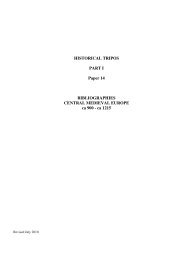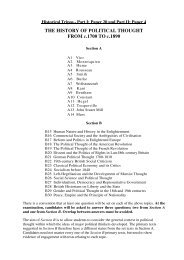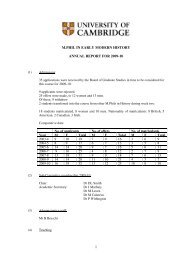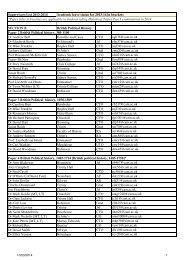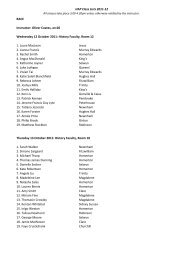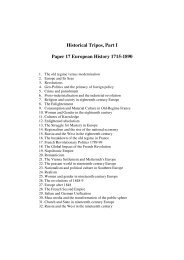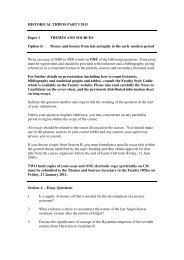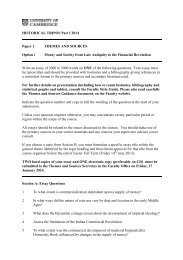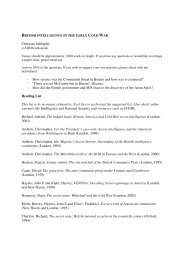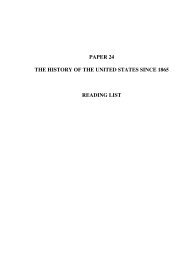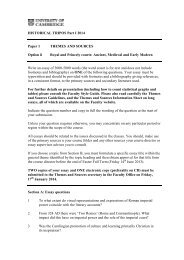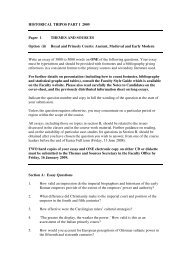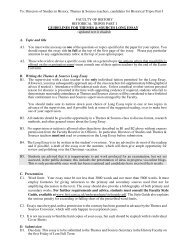Course Handbook - Faculty of History - University of Cambridge
Course Handbook - Faculty of History - University of Cambridge
Course Handbook - Faculty of History - University of Cambridge
Create successful ePaper yourself
Turn your PDF publications into a flip-book with our unique Google optimized e-Paper software.
4.2 Research Methods (10%)<br />
Research Methods Training <strong>Course</strong> (6%)<br />
Students will submit workbooks. These are marked by the instructors involved in the Joint Schools<br />
Research Methods <strong>Course</strong> on a fail, pass or high pass basis. For the purposes <strong>of</strong> its marking scheme,<br />
this MPhil adopts the following convention: fail = 55%, pass = 67%, and high pass =75%.<br />
Dissertation Proposal Essay (4%)<br />
This essay, <strong>of</strong> up to 4,000 words, is intended to help students define the scope <strong>of</strong> the dissertation as<br />
well as the sources and methods to be adopted. It is primarily an historiographical investigation <strong>of</strong><br />
the secondary literature, which contextualises the topic which is to be investigated, in the<br />
dissertation. This is done by drawing on a relevant aspect <strong>of</strong> the qualitative and quantitative methods<br />
teaching in the joint schools’ courses. The approach places the planning <strong>of</strong> the research in a broad<br />
context that defends choices <strong>of</strong> methods. The student should also deal with how their proposed<br />
research will attempt to answer the questions arising from the historiographical investigation, but it<br />
is not intended that the course <strong>of</strong> research should be described in detail here. When marking this<br />
essay, examiners should note that students will have had only limited time to consult their archives<br />
at this point because the first two terms concentrate largely on the course work element <strong>of</strong> the Mphil.<br />
Thus, some aspects <strong>of</strong> the proposed research will have to be formulated in a preliminary way and the<br />
candidate should not be penalised for this. It is more important that the candidate understands the<br />
nature <strong>of</strong> the questions that the research will address.<br />
4.3. Advanced Papers (10% each)<br />
These papers are taught using a mixture <strong>of</strong> lectures and seminars amounting to 16 contact hours<br />
each, and are based on more specialized topics than the central concepts essay, and should be more<br />
specific. All Advanced Papers are examined in the last week <strong>of</strong> Lent Term (NOTE: The week after<br />
‘Full Term’ finishes) by term papers based on the specific topics discussed in the course. Both <strong>of</strong><br />
these essays, however, will be written during a limited time period <strong>of</strong> one week. These essays will<br />
be 3-4000 words in length each and will be based on a topic or topics discussed in the course, and<br />
students will be expected to cite a reasonable selection <strong>of</strong> secondary or/and primary sources<br />
discussed. Two copies <strong>of</strong> each essay are required. The essays should normally be word processed,<br />
double-spaced, and written with footnotes and a bibliography, although examiners should take into<br />
consideration the limited amount <strong>of</strong> time available for each essay.<br />
5. PART II: THE DISSERTATION<br />
Dissertations are researched and written over a five month period from April to August and should<br />
reflect research which could reasonably be expected to be done in this period. The criterion for<br />
assessment in 3. above should be followed. In some cases involving an extensive amount <strong>of</strong> data<br />
collection (such as, for instance, parish reconstitution) where the student intends to continue the<br />
project with the PhD, and it is impossible to collect more than a part <strong>of</strong> the data in the short time<br />
available for research during Easter Term and Summer, it is permissible for the student to present<br />
only part <strong>of</strong> the data for analysis. In such cases this should be clearly stated in the introduction, and<br />
there must be enough data and analysis presented for the examiner to be able to judge the<br />
candidate’s analytical skills even if it might be impossible to draw firm conclusions based on the<br />
partial data available. The dissertation should be marked on this basis and the candidate should not<br />
be penalised for this.<br />
A MARK OF 67 OR ABOVE SHOULD BE AWARDED IF THE CANDIDATE MIGHT<br />
REASONABLY BE EXPECTED TO GO ON TO COMPLETE A SUCCESSFUL PHD.<br />
6. NON-NATIVE ENGLISH SPEAKERS<br />
Many candidates are not native English speakers. They are expected to make use <strong>of</strong> all available<br />
resources to ensure that both essay work and dissertation are written in correct English. Examiners<br />
should acknowledge the special difficulties faced by non-native speakers, while commenting on<br />
20




